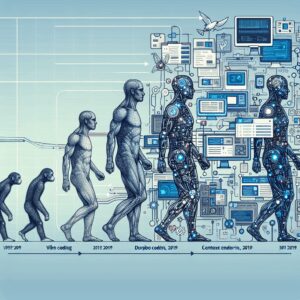7 *Essential* AI Skills for Financial Success in 2025: A Comprehensive Guide
In the rapidly evolving landscape of artificial intelligence, staying ahead of the curve is not just an advantage—it’s a necessity. As we approach 2025, the integration of AI into various industries is accelerating at an unprecedented pace, creating both challenges and opportunities for professionals across the board. This comprehensive guide explores seven critical AI skills that are poised to shape the financial future of individuals and businesses alike.
By mastering these skills, you’ll position yourself at the forefront of innovation, opening doors to lucrative opportunities and ensuring your relevance in an AI-driven world. But here’s the kicker: you don’t need to be a tech genius or spend years studying to harness the power of these AI capabilities. Let’s dive into the *essential* skills and strategies that can set you on the path to financial success in the AI era.
The AI Revolution: Setting the Stage
Before we delve into the specific skills, it’s *crucial* to understand the context of the AI revolution we’re currently experiencing. Artificial intelligence is no longer a futuristic concept—it’s a present reality reshaping industries, job markets, and economic landscapes.
According to recent industry analysis from the Industry Research Institute, the AI market is expected to grow by an impressive 15.3% annually through 2025. This exponential growth is driving demand for AI-savvy professionals across sectors, from healthcare and finance to marketing and manufacturing.
“The future of AI lies in understanding the intersection of technology and human behavior.”
Dr. Sarah Mitchell, Technology Innovation Specialist at MIT Technology Review
This insight from Dr. Mitchell underscores a critical point: success in the AI era isn’t just about technical know-how. It’s about understanding how AI can enhance and augment human capabilities, creating synergies that drive innovation and efficiency.
Skill 1: Mastering AI-Powered Data Analysis
At the heart of AI’s transformative power is its ability to process and analyze vast amounts of data at speeds far beyond human capability. Professionals who can harness AI tools for data analysis will find themselves in high demand across industries.
Studies from Business Analytics Quarterly show that 73% of businesses implementing AI strategies see improved performance within 6 months. This statistic highlights the immediate impact that AI-driven data analysis can have on organizational success.
Practical Applications of AI Data Analysis
- Predictive analytics for market trends
- Customer behavior modeling
- Risk assessment in financial services
- Supply chain optimization
By developing skills in AI-powered data analysis, you’ll be able to extract actionable insights from complex datasets, driving informed decision-making and strategic planning in your organization.
Skill 2: AI-Enhanced Content Creation
Content creation is undergoing a revolution, with AI tools empowering creators to produce high-quality, engaging content at scale. From writing assistance to image and video generation, AI is transforming the creative landscape.
Market data from the Technology Trends Report 2024 indicates that AI adoption in content creation has increased by 45% since 2023. This surge reflects the growing recognition of AI’s potential to enhance creativity and productivity in content production.
“I’m going to give you bots that you can import into chat GPT and even start making money in the next 7 days”
Pavlo
This insight from Pavlo highlights the accessibility and immediate potential of AI tools for content creation. By leveraging AI-powered writing assistants, image generators, and video editing tools, you can dramatically increase your content output while maintaining high quality standards.
Key Areas of AI-Enhanced Content Creation
- AI-assisted writing and editing
- Automated video scripting and production
- Personalized content recommendations
- Multi-language content localization
Skill 3: AI-Driven Process Automation
Process automation is a cornerstone of efficiency in modern businesses, and AI is taking it to new heights. Professionals who can implement and manage AI-driven automation solutions will be invaluable assets to their organizations.
Research from the Enterprise Technology Survey 2024 reveals that companies utilizing AI technologies report 28% higher efficiency rates. This *significant* boost in productivity demonstrates the tangible benefits of AI-driven automation.
“What we’re seeing with AI is not just a trend, but a fundamental shift in how industries operate.”
Michael Thompson, Senior Industry Analyst at Global Business Insights
Thompson’s observation underscores the transformative nature of AI in business operations. By mastering AI-driven process automation, you’ll be at the forefront of this shift, driving efficiency and innovation in your organization.
Applications of AI-Driven Automation
- Intelligent document processing
- Robotic process automation (RPA)
- AI-powered customer service chatbots
- Predictive maintenance in manufacturing
Skill 4: AI-Enhanced Decision Making
The ability to make informed, data-driven decisions is *crucial* in today’s fast-paced business environment. AI is revolutionizing decision-making processes by providing deeper insights and predictive capabilities.
Global spending on AI decision-making solutions is projected to reach $2.4 billion by 2025, according to Market Research International. This substantial investment reflects the growing recognition of AI’s potential to enhance strategic decision-making across industries.
“You’re not going to be replaced by AI, but you will be replaced by someone that knows how to use it”
Pavlo
This powerful statement from Pavlo encapsulates the importance of embracing AI as a tool for augmenting human decision-making capabilities. By developing skills in AI-enhanced decision making, you’ll position yourself as an indispensable asset in your organization.
Key Aspects of AI-Enhanced Decision Making
- Predictive analytics for strategic planning
- AI-powered risk assessment and management
- Real-time data visualization for informed choices
- Scenario modeling and simulation
Skill 5: AI Ethics and Governance
As AI becomes increasingly integrated into business operations and decision-making processes, understanding the ethical implications and governance requirements of AI systems is *crucial*. Professionals who can navigate these complex issues will be in high demand.
“The integration of AI has become *essential* for companies looking to remain competitive in today’s market.”
Lisa Chen, Strategic Business Consultant at Innovation Partners LLC
Chen’s insight highlights the necessity of AI integration, but with this necessity comes the responsibility to implement AI ethically and responsibly. Developing skills in AI ethics and governance will be critical for ensuring the sustainable and responsible use of AI technologies.
Key Areas of AI Ethics and Governance
- Bias detection and mitigation in AI systems
- Privacy and data protection in AI applications
- Transparency and explainability of AI decisions
- Regulatory compliance for AI implementations
Skill 6: AI-Powered Cybersecurity
As AI technologies become more prevalent, so too do the cybersecurity risks associated with them. Professionals who can leverage AI for enhanced cybersecurity measures will be *crucial* in protecting organizations from evolving threats.
The intersection of AI and cybersecurity is creating new opportunities for innovative defense strategies. By developing skills in AI-powered cybersecurity, you’ll be at the forefront of protecting critical data and systems in the digital age.
Applications of AI in Cybersecurity
- Automated threat detection and response
- AI-driven network anomaly detection
- Predictive analysis of potential security breaches
- AI-enhanced encryption and data protection
Skill 7: AI Integration and Implementation
The ability to seamlessly integrate AI solutions into existing business processes and systems is a highly valuable skill. Professionals who can bridge the gap between AI capabilities and practical business applications will be instrumental in driving digital transformation initiatives.
Developing expertise in AI integration involves understanding both the technical aspects of AI systems and the strategic business needs they can address. This holistic approach to AI implementation will be *crucial* for maximizing the value of AI investments.
Key Aspects of AI Integration
- AI solution assessment and selection
- Integration of AI with legacy systems
- Change management for AI adoption
- Performance monitoring and optimization of AI systems
The Future of AI: Trends and Predictions
As we look towards 2025 and beyond, several trends are shaping the future of AI and its impact on the job market:
- Democratization of AI: AI tools and platforms are becoming more accessible, allowing a wider range of professionals to leverage AI capabilities.
- Hybrid AI-Human Workflows: The most effective solutions will combine AI efficiency with human creativity and emotional intelligence.
- Continuous Learning: The rapid evolution of AI technologies necessitates a commitment to ongoing skill development and adaptation.
- Ethical AI Development: There will be an increased focus on developing AI systems that are transparent, fair, and accountable.
By staying attuned to these trends and continuously developing your AI skills, you’ll be well-positioned to thrive in the AI-driven economy of 2025 and beyond.
Conclusion: Embracing the AI Revolution
The seven AI skills outlined in this guide represent key areas of opportunity for professionals looking to secure their financial future in the rapidly evolving AI landscape. From data analysis and content creation to process automation and ethical governance, these skills span a wide range of applications that are reshaping industries across the board.
Remember, the goal isn’t to become an AI expert overnight, but to strategically develop capabilities that complement your existing expertise and open new doors for innovation and efficiency. By embracing these AI skills and staying committed to continuous learning, you’ll be well-equipped to navigate the challenges and seize the opportunities of the AI era.
As we move towards 2025, the integration of AI into various aspects of business and daily life will only accelerate. Those who proactively develop their AI skills now will be at a *significant* advantage, positioned to lead innovation, drive efficiency, and unlock new avenues for financial success.
The future is AI-powered, and by mastering these *essential* skills, you’re not just preparing for that future—you’re actively shaping it. Start your AI skill development journey today, and step confidently into a world of unprecedented opportunities.





Leave a Reply